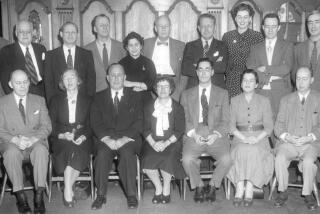Coming Up to Oxbridge : The True Ivory Tower : UP AT OXFORD, <i> By Ved Mehta (W. W. Norton: $25; 432 pp.)</i>
- Share via
This seventh volume of Ved Mehta memoirs tells of his Oxford years (1956-59). Having made his way from India to Arkansas, where he attended a school for the blind, he then by brilliance, charm and drive earned a degree with honors from Pomona College. His dream, though, was to go on to Oxford and (if he could take first-class honors there) to become a great academic or a great political figure. Unable to compete for a Rhodes Scholarship (his blindness prevented his fulfilling the athletic requirements), he would not accept the mere Harvard alternative that was offered him. In 1956, he did get himself accepted to study for a degree at Balliol--one of the oldest and most intellectually prestigious of Oxford colleges, though slightly less venerable and distinguished than Merton College--and took an honors degree at Oxford, though I leave it to readers to find out whether of first or second class.
Fascinating, discreetly but tartly gossipy, glinting with fun but darkened by tragedy, Mehta’s book shows us a 1950s Oxford both like and very different from Evelyn Waugh’s 1920s version. Not possessed by the green-eyed Muse or Tiresias-like genius of Waugh, Mehta gives us nicer orgies and more scholarly debates, more learned dons and fewer hearty (or noble) dunces. Mehta’s golden lads and lasses fight for places in a world of ideas, in ivory towers as well as country places, castles, courts or ministries. His laughter is gentler than Waugh’s, white-toothed but not going for the jugular--sometimes, indeed, almost too gentle, reminding one of what Pope said of Joseph Addison, that he would “just hint a fault, and hesitate dislike.” He is less concerned to expose naked emperors than to catch brilliant minds darting or hovering like hummingbirds.
We are shown the intellectual achievements, the scholarly integrity of the students and teachers he encountered; along the way he gives, also, a warm-toned and delicately nuanced account of his parents--traditional mother, generous and trusting father--and the dark comedy of their European tour before he came up to Oxford. The ironic relations between paternal India and filial England itch like a rash beneath his dinner-jacketed narrative, and he shows how many of the brilliant careers he chronicles end with suicide: “We poets in our youth begin in gladness,” as Wordsworth said, “but thereof come in the end despondency and madness.” With funny stories enough for David Letterman or Dick Cavett, this is no nostalgia trip but a serious and richly detailed account of getting into, through, and safe viewing distance away from one of the world’s great universities in the middle of the 20th Century.
Master of lucid narrative, Mehta makes us companions on this journey to Oxford, the first entry into his Balliol rooms, all the chill and gloom and strangeness of that intimidating day, then the struggle to find his place, to decide just what he wanted to study during his two years there (a painfully comic affair), to choose a tutor and make the special arrangements needed for him as a blind student--readers, amanuenses, the labyrinthine walks and Byzantine ways of college, university and town. Cheerful and offhand in tone, polished and practiced in technique, his stories conjure the Oxford of 1956 onto the page--the feel of it, the voices, follies and fun of its students in their absurd black gowns, their arguing, drinking, gossiping. He takes us inside the elite “debate” clubs, lets us hear the absurd and brilliant discussions, witness the snobs and slobs, arties and hearties among the undergraduates. He takes us into tutorials with eccentric and deeply learned teachers, tells us what he had to do in writing his essays on Anglo-Saxon or Cromwellian questions.
The Beat Generation was thumbing roads not taken, and the Tripsters were limbo-dancing toward us just below the horizon. Mehta tells of a reading by Allen Ginsberg and Gregory Corso at the Oxford University Labour Club: It was tough enough for Ginsberg’s unzipped poetry to impress such buttoned-down metricians, but when Corso got up and dithy-Ramboed to those ban-the-bombers his paean to the Hydrogen Bomb, they took off their shoes and threw them at him--then retrieved them and walked out on the reading. Ah well, they expelled Shelley once--and in 1992 the Oxford Student Union would applaud Ronald Reagan!
Tested against my 1952 memories of coming up to Merton College (a smaller, pleasanter, brighter place than Balliol), Mehta’s account rings true, though it reminds me how much closer to World War II was the Oxford I came into than the one he entered just four years later. In 1952, chocolate, meat and sugar were still rationed, soot-blackened buildings yet uncleaned, bombed ruins and boarded churches not yet cleared or rebuilt, and the Great London Smog of December, 1952, had not come down to kill its hundreds, driving the British to cleanse the air and the cities enough so it is now much easier to bear an English winter. By 1956, Mehta’s Balliol was still grimy, but food-rationing had ceased, new buildings were rising and old ones were getting plumbing and heating of sorts. An England that had fought magnificently to save Europe from the monstrous Nazis was just beginning to wonder exactly what it had fought for, and where it stood in the new order it had helped bring alive. When I left Oxford in 1954 it was not even ready to face the loss of Empire--but when Mehta arrived, Anthony Eden’s effort (in the Suez crisis) to teach those upstart Egyptians who was boss ended with Dwight Eisenhower’s showing Eden that the real boss in 1956 was the United States. England would still be able to draw its lines in the sand--in 1961, for instance, keeping Iraq from reclaiming a Kuwait that had carved away in the late 19th Century--but after Suez, the recessional was not reversible.
Forty years later, Europe, the Americas, Asia, perhaps Africa, are poised for the next century’s struggles. Mehta’s grandchildren may see what foolish lines in what deadly sands--in the Near East, Africa, the Moon, Mars, some other planetary system?--will be filled with blood by “over-educated Oxford SOBs” (as Harry Truman once described Senator Fulbright, who actually tried to stop some carnage prolonged by the noisy Americans Johnson and Nixon). Mehta’s Oxford, as he imagined it when he went there to study, was a center of intellectual empire, the best place in the world to learn the world’s history and meaning, a place where satraps had been trained for a century, savants for a millennium. At this end of the 20th Century, Oxford is still a great university, though set now in a shrunken nation. England, like Denmark, has lost the imperial dream, but unlike that Viking California is not at ease in a buttery Zion. Oxford purrs within a Sphinx’s paws--but lions are not pussycats: England still trains counter-insurgency forces, and new colleges at Oxford are devoted to international business and politics. There are more books to its epic than we have yet unrolled: Will it be England, or Germany, or Russia, by whom Europe’s centurions of 2094 are sent to do their duty in, say, the Andromeda Galaxy?
More to Read
Sign up for our Book Club newsletter
Get the latest news, events and more from the Los Angeles Times Book Club, and help us get L.A. reading and talking.
You may occasionally receive promotional content from the Los Angeles Times.







